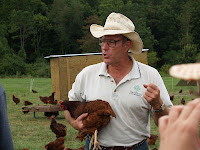 |
| Author: Dabdiputs |
Salatin is fascinatingly difficult to pigeonhole. He is one of the superstars of the organic/sustainable farming world, yet he is refreshingly free of any whiff of patchouli, free of the hollow twang of kumbaya around the campfire or any of the hippy-dippy trappings of many organic enthusiasts. When, after all, was the last time you heard about an organic farmer who graduated from Bob Jones University or refers to the Civil War as the "War of Northern Aggression"?
Salatin prioritizes efficiency and (gasp!) profitability as much as any CEO, and evokes in his personality the charisma of the self-made entrepreneur like Franklin or Ford, rather than the long-haired commune-dwelling back-to-the-land radical.
One of the great resources on the Polyface Farms website is a list of recommended books, which I have been trying to work through here and there. Bill Mollison's Permaculture: a Designer's Manual
Permaculture presents an interesting challenge to modern farming -- not only conventional, but organic. A lot of the modern mega-CSAs, for instance (150+ shares) are as heavily reliant on annuals and tillage as conventional farmers, and sometimes even more so, since conventional no-till agriculture is in some ways more widely accepted than organic no-till. The long-term impact of even organic tillage on the soil, especially in intensive plantings, remains to be seen.
Salatin's model is, as you might guess, heavily influenced by permaculture. Since his main crop is grass to feed his cows (and, more indirectly, his chickens), he can rely on a perennial, no-till, no-seed crop which is cultivated and manured by the animals themselves (the "animals as co-workers" concept in action).
Gene Logsdon's The Contrary Farmer
Another book on Salatin's list that I picked up recently and was a little surprised I enjoyed so much is Stephen Covey's The 7 Habits of Highly Effective People. I have a healthy suspicion of books of the "self-help" genre, actually for reasons that Covey explains quite well. According to him, most recent self-help lit is based on the "personality" paradigm of success: success is caused by possessing the right techniques for greasing the social wheels, irrespective of personal character. Covey, on the other hand, is focused on the principles and especially habits (as the title implies) that make people successful (readers of the philosopher Alasdair MacIntyre's seminal After Virtue
I'm still working through the book, so no final judgments yet, but so far it is living up to Salatin's recommendation as the "the book which, next to the Bible, everybody ought to read." (In his article in ACRES USA on Family Friendly Farming.)
Another book from the recommended list I have read and would heartily commend as well is Sally Fallon's Nourishing Traditions
One which I haven't read, but am very curious about, is James Davidson's The Sovereign Individual. The description by Publishers' Weekly on Amazon sounds pretty mind-boggling:
The computer revolution, in the authors' dire scenario, will subvert and destroy the nation-state as globalized cybercommerce, lubricated by cybercurrency, drastically limits governments' powers to tax. They further predict that the next millennium will see an enormous decline in the influence of politicians, lobbyists, labor unions and regulated professions as new information technologies democratize talent and innovation and decentralize the workplace.Something tells me that it doesn't seem so dire to the man who wrote a book titled Everything I Want to Do is Illegal
No comments:
Post a Comment